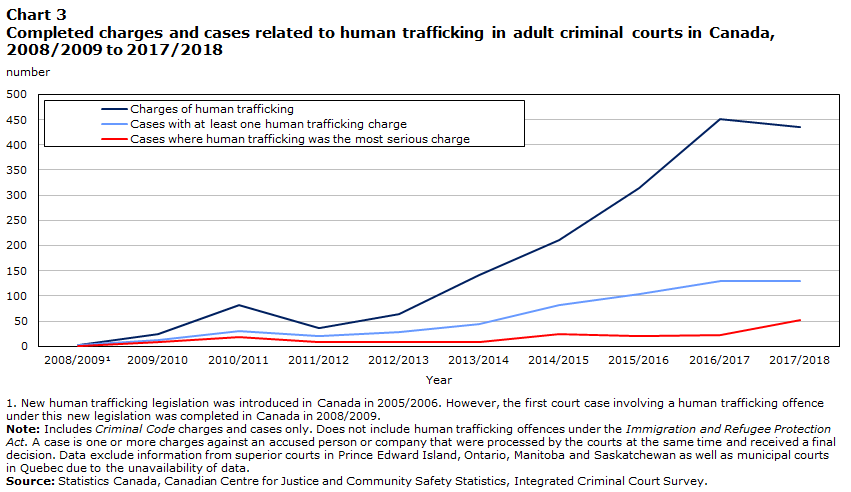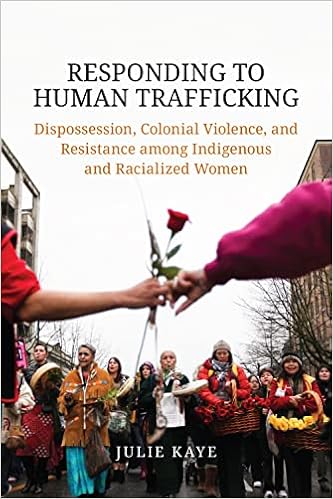Human trafficking is a serious issue in Canada. From 2009 to 2018, there were over 1,700 police reported cases of human trafficking and 97% of those cases were trafficking of females (Cotter, 2020). The Government of Canada released a National Strategy To Combat Human Trafficking 2019-2024 which highlights empowerment, prevention, protection, prosecution, and partnerships as key areas of development. There are multiple laws in Canada to address human trafficking, as well as organizations that provide assistance in reporting and identifying human trafficking incidents. For more information, check out some of the resources on this page as a starting point for your research.

Image from Cotter (2020).
Sources:
The global problem of human trafficking is only beginning to be recognized in Canada, even though it has been hidden in plain sight. In Invisible Chains, Benjamin Perrin, an award-winning law professor and policy expert, exposes cases of human trafficking, recording in-depth interviews with people on the front lines--police officers, social workers, and the victims themselves--and bringing to light government records released under access-to-information laws.
Sex Industry Slavery highlights the voices of people who need to be heard and introduces practical solutions to the social scourge of sexual slavery and exploitation in modern society.
In Keetsahnak/Our Murdered and Missing Indigenous Sisters, the tension between personal, political, and public action is brought home starkly as the contributors look at the roots of violence and how it diminishes life for all. Together, they create a model for anti-violence work from an Indigenous perspective. They acknowledge the destruction wrought by colonial violence, and also look at controversial topics such as lateral violence, challenges in working with “tradition,” and problematic notions involved in “helping.”

Responding to Human Trafficking is the first book to critically examine responses to the growing issue of human trafficking in Canada. Julie Kaye challenges the separation of trafficking debates into international versus domestic emphases and explores the tangled ways in which anti-trafficking policies reflect and reinforce the settler-colonial nation-building project of Canada.
The UFV Library has a vast collection of print and electronic books and videos for students to use for their studies. Remember: when accessing resources off-campus, users will be prompted to enter their UFV credentials to gain access. For tips on coming up with a topic - please visit our Library Research: Starting Strong LibGuide (link below). For more information about how to find online videos - please visit our Streaming Video Collections LibGuide (link below).
[Note: We are working to improve access to our collections and revising our subject headings to be more respectful and inclusive. Please be aware that you may see certain words or descriptions in search results or library materials which reflect the author’s attitude or that of the period in which the item was created and may now be considered offensive.]
Example subject searches (click on the links to see the lists of related books and videos):
![]() Librarians Tip! Don't forget - you can try searching for keywords that are not officially listed as 'subjects' such as 'sex trafficking and Canada' or 'human trafficking and indigenous women'.
Librarians Tip! Don't forget - you can try searching for keywords that are not officially listed as 'subjects' such as 'sex trafficking and Canada' or 'human trafficking and indigenous women'.
Databases are collections of different types of sources (usually digital) such as:
Here are a few popular databases when looking for information related to Adult Education, but you can find more options in our list of Education related Databases (link below).
For more information on types of sources (including scholarly articles), please review our Evaluating Sources LibGuide (link below) and make sure to check your assignment instructions before your start your research to see what types of sources your professor has asked you to use for your project(s).
The following strategies can be useful to help you search for and choose an academic/scholarly research article
1. Analyze your topic statement for search terms
2. Connect different concepts with "AND"; connect similar (or synonymous) concepts with "OR" You also need to use quotation marks to search complete phrases.
e.g. Human Trafficking AND Canada
e.g. Human Trafficking OR Sex Trafficking
3. Use limiters (options on the left or right side of the search results) to narrow your results list such as publication dates, peer-reviewed, and full text
4. Be sure to read the abstracts - they will often reveal enough "clues" to tell you if the article is relevant or not.
5. If you do not find articles that interest you, look at your results. See if there are new words or new search terms that you can use that will help you improve your search.
Users can look for videos from the library homepage, or go to one of the Library's video databases. For more information on finding videos please see our Streaming Videos LibGuide.
© , University of the Fraser Valley, 33844 King Road, Abbotsford, B.C., Canada V2S 7M8

